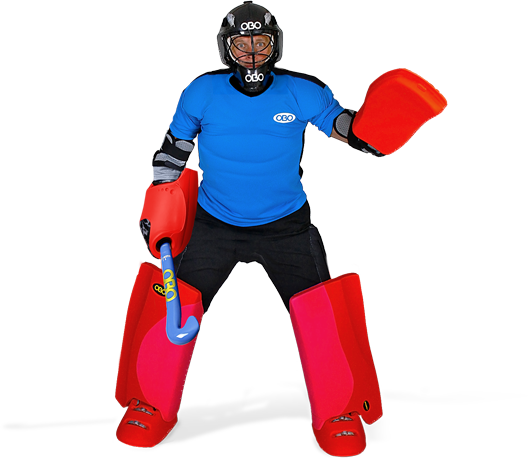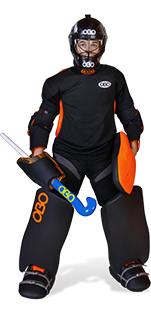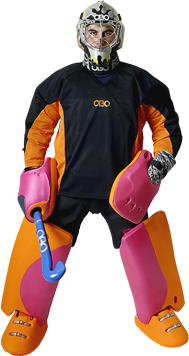KEEPERS RESOURCES

What makes a great goalkeeper?
It is good to pinpoint the qualities of a top class goalkeeper, so that you know what you’ve got to work towards if you want to be the best. Aside from hard work and perseverance, it takes a special athlete to make it at the top. There are number of skills, some of which are natural and gifts we are born with (like amazing reaction speeds/reflexes), but it is possible to work hard to improve them, if you want to reach the top. Coaches look for these abilities, and this is important to remember if you want to be scouted to play at the best levels.
The following is a list of qualities that all the elite crop of goalkeepers have:
Athletic
To be able to make those highlight reel saves, you need to be athletic. Although field hockey goalkeepers have all that extra padding, they need to be quick on their feet and acrobatic in save making. Just like soccer goalkeepers who leave their feet a lot, field hockey goalies need to be prepared to jump, leap and dive around to make the save, especially against tricky shooters with hard, well placed shots or quick drag flicks.
Abile to read the play
Elite goalkeepers are aware of what players are going to do, which helps them make up their mind on when and how to make the save. Athleticism helps them to get into place to stop the ball, but it is their ability to read the game that makes the save. By being able to work out what will happen, they are also able to make better decisions as a result; one step ahead in the battle against the opposition.
Agility
At the top level, goalkeepers often have to make consecutive saves if the shot is uncontrollable (unable to direct the rebound given the power of the shot). To be able to do so, the goalkeeper needs to be agile; getting up immediately and recovering to stop the shot. With immediate changes in play, goalkeepers will also have to change direction. If you have to move from post to post to be attempt a save on a passed shot, then you need to be lightning fast to get there in time to block. This is what agility is all about.
Strong mental attitude
A strong mentality is so important to being an elite athlete; dealing with the pressures that come with the position. Goalkeepers are competitors and don’t ever like being beaten. If a goal is scored against them, it is immediately forgotten about and ignored, rather than being worried about and causing more goals. The goalkeeper needs to carry their team and help them win. Especially at the international stage, goalkeepers would underperform if they were nervous and showed it.
Not a quitter
A goalkeeper has to be a fighter. If the chips are down and they are up against it, the goalkeeper shows no sign of giving up. If the game is already lost and there is no chance of evening the score, the goalkeeper will still pull off the saves to keep the game alive. This is so important in close games when the score is tied, or down a single goal, because it shows the team that the goalkeeper doesn’t give up and will help the team to make a comeback.
Good decision maker
Goalkeepers have to be elite decision makers: they need to know when to do the right thing and do it properly at the right time. Things such as whether to come out and block slide on a 1-on-1, aggressively, or play the shot and make the save. The goalkeeper has to be able to read the play and make the correct decision. Working with the defence is crucial; if they have their support then it makes it easier to play passively, but if the defence cannot get back in time, then the goalkeeper needs to take charge. It is also about making the right save selection; prioritising the rebound placement so there are no second chances.
Good reflexes
Reflexes are another obvious part of elite goalkeeping. Good reflexes are an essential part of goalkeeping and are even more important at the top level of the game. It is not a skill, which you can learn (although you can improve it), so elite goalkeepers are normally naturally gifted with good reactions. To be able to stop a shot from a guy with a stinging shot like Jamie Dwyer, you need to have lightning fast reactions.
Technically good
Obviously goalkeepers need to have good technique and a good skill set, otherwise they will give away easy goals through bad posture, save choice, or simply not being on angle. A technical game is important: without it, can you cannot succeed at the highest level because the opposition will easily pick apart your game. The ability to control rebounds, make difficult saves look easy etc. is all part of this. Coaching helps this; knowing what to do in a certain situation, and putting it into practise makes your job easier. Some goalkeepers get a head start in their careers because of having coaching from a young age, but it is still possible to progress with out it and then get coaching after being recognised.
Experienced
Game experience is vital. The more game experience the better; the best goalkeepers are those that are experienced, so elite goalkeepers should have bags of it (i.e. they will obviously have been playing since childhood, but will also have experience playing at high levels or junior international games!). A goalkeeper who has played lots of games can call upon these experiences when faced with an all-important, difficult matches; helping them make the right choices or stay calm when it gets tough. Experience helps the goalkeeper with the ability to read the play and know what is going to happen. Game experience is invaluable and it is better to be experienced than rely on skill.
Aggressive
Great goalkeepers are often aggressive; taking charge of situations and dominating their area. Goalkeepers need to be aggressive; they need to dominate their D and shut down plays if needs be. You cannot always be passive or too reliant on your defence, such as needing to intercept passes that will prevent scoring chances. Obviously being too aggressive is a danger, but the ability to challenge the attacker and make their life difficult is essential if you want to go far.
Vocal
A great goalkeeper is like a choir master, in charge of the orchestra; they are the one who instructs their team on what to do. The goalkeeper has the best view on the pitch and they should use that to their team’s advantage. Providing constant communication to their defenders will help the team make the right decision in how to deal with a player. Defenders want to know what to do and elite goalkeepers will be able to tell them.
Brave
Goalkeepers have to be brave and confident. If you are to reach the best level of the game, then you need to be unafraid of the ball. When you train and play with top level shooters, shots come at you hard and fast, and there is no time to get scared or flinch. An elite goalie is not afraid of the ball; they are better than it and control it, hard shots don’t bother them. A goalkeeper shouldn’t be afraid of hard shots, instead they should believe they are like tennis balls – easy to stop!
Attentive
Great goalkeepers also have strong concentration levels, able to quick ‘switch on’ when it is important to do so. Not content to ‘nod off’, they are aware of what is going on in front of them, taking part in the game and organising their defence vocally. Without this ability, they could be caught off guard and easily concede a goal.
Comments
Leave Your Comments Below















